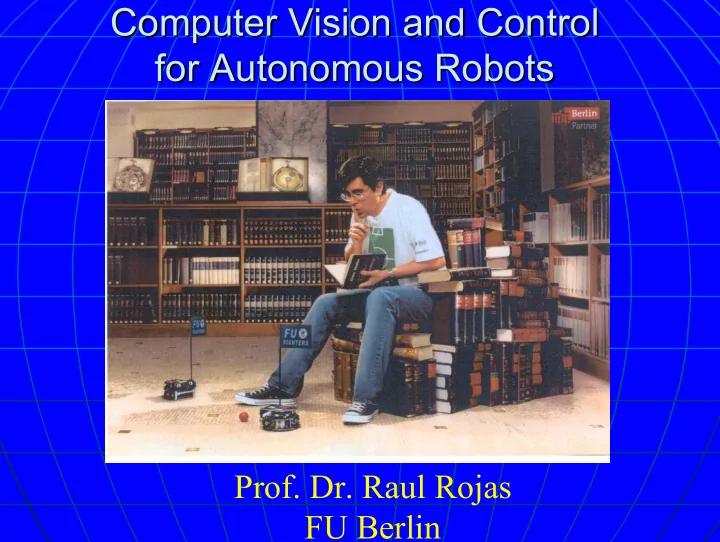

Computer Vision and Control Control Computer Vision and for Autonomous Autonomous Robots Robots for Prof. Dr. Raul Rojas FU Berlin
Embodied Intelligence: A new Embodied Intelligence: A new Paradigm for AI Paradigm for AI - Intelligence Intelligence needs needs a a body body: : mechanics mechanics - Computer Computer vision vision in real time in real time - „Artificial Artificial Intelligence Intelligence is is the the art and art and science science „ - Energy Energy management management - of the the subconscious subconscious“ “ of - Local Local control control - - Communication Communication between between agents agents - - Coordination Coordination and and team team behavior behavior - - Adaptation and Adaptation and learning learning -
Robotic Soccer Soccer as AI as AI Robotic Benchmark Benchmark � RoboCup RoboCup started started with with IJCAI 1997 IJCAI 1997 � � I I - - Simulation Simulation league league � � II II – – Small Small size size league league � � III III- - Mid Mid- -size size league league � � IV IV- - Legged Legged league league � � V V – – Humanoid Humanoid league league �
Small- -Size Size Liga Liga Small 18 cm in diameter 4.5 by 5 meter field Five vs five
Lisbon 2004 2004 Lisbon
Kicking the distance Kicking the distance
Mid- -size size league league Mid four on field four 12 × 8 meters
Lisbon 2004 2004 Lisbon
Pressuring the goalie Pressuring the goalie
Our small- -size robots size robots Our small
Omnidirectional Design Design Omnidirectional
Omnidirectional Control Control Omnidirectional
Our mid mid- -size size robots robots Our Omnidirectional vision - Laptop for control - Firewire video camera
CAD Design CAD Design
FUXABOT: The The Hexapod Hexapod FUXABOT:
I Global vision I Global vision
Global vision vision Global wireless communication computer global camera
The world world is is colored colored The Team color ball
Projective Transformation Projective Transformation
Automatic camera calibration Automatic camera calibration
Illumination artifacts Illumination artifacts
Adaptive color maps Adaptive color maps
Tracking helps helps computer computer vision vision Tracking • the position of the ball is predicted • variable search frame • just a few pixels are read
Tracking the the robots robots Tracking We need the data of the future Data from the past t vision communication delay delay
Predict the the robot‘s robot‘s movement movement Predict positions ( x 1 , y 1 ) ( v x , v y, w ) 1 ( x 2 , y 2 ) ( x , y, θ ) predictor ( v x , v y, w ) 2 predictor ( x 3 , y 3 ) Position and orientation four ( v x , v y, w ) 3 frames in the future (100 ms) ( x 4 , y 4 ) ( v x , v y, w ) 4 commands
II Local vision II Local vision
Our first omnivision omnivision robots robots Our first
Spherical and parabolic Spherical and parabolic transformations transformations
The field seen with our mirror The field seen with our mirror
Locating the robot Locating the robot Parabolic M irror 500 400 distance 300 200 100 0 0 0.1 0.2 0.3 0.4 pixel distance
Expectation- -Maximization Maximization Expectation The model „attracts“ the cloud of points
Forces on real data
Precomputed resultant forces for each coordinate
Obstacle Detection
Obstacle Modelling
Obstacle Fusion
Obstacle Identification
III Reactive Behavior III Reactive Behavior
Reactive Behavior Behavior Control Control Reactive slow fast sensors behaviors actuators
Structure of a of a layer layer Structure Higher layer sensors effectors sensors behaviors actors Lower layer
Kicking reflex reflex Kicking Kicking reflex activated
Screenshot of control software Screenshot of control software
IV Learning and IV Learning and Coaching the robots Coaching the robots
Anpassbarkeit Anpassbarkeit
Raumfreiheit Raumfreiheit
Beispiel- -Eingabe Eingabe Beispiel
Learning to pass Learning to pass
Passing game game Passing
Team Play Team Play
The Goalie Goalie The
Goalie again Goalie again
Learning: robot : robot heal heal yourself yourself Learning
Invert the prediction Invert the prediction ( x 1 , y 1 ) ( v x , v y, w ) 1 ( x 2 , y 2 ) ( x , y, θ ) predictor ( v x , v y, w ) 2 predictor ( x 3 , y 3 ) desired position ( v x , v y, w ) 3 ( x 4 , y 4 ) ( v x , v y, w ) 4
One burnt motor One burnt motor
V Summary and V Summary and Outlook Outlook
FU Fighters FU Fighters � 1999 1999 Vizeweltmeister Vizeweltmeister � � 2000 2000 Europa- - und Vizeweltmeister und Vizeweltmeister Europa � � 2001 2001 Vierter Platz Vierter Platz � � 2002 2002 Europa- - und Vizeweltmeister und Vizeweltmeister Europa � � 2003 2003 Europameister Europameister � Dritter Platz (small small- -size size) ) Dritter Platz ( � � Halbfinalist (mid mid- -size size) ) Halbfinalist ( � � � 2004 2004 Weltmeister (small small- -size size) ) Weltmeister ( � Vierter Platz (mid mid- -size size) ) Vierter Platz ( � �
Small-Size Team Anna Egorova, Alexander Gloye, Mark Simon, Cüneyt Göktekin, Bastian Hecht, Achim Liers, Oliver Tenchio, Fabian Wiesel, Lina Ourima, Maria Jütte, Thomas Sunderman Susanne Schöttker-Söhl
Mid- -size size Team Team Mid Holger Freyther, Ketill Gunnarsson, Henning Heinold, Felix von Hundelshausen, Wolf Lindstrot, Marian Luft, Slav Petrov, Michael Schreiber, Frederik Zilly, Fabian Ruff, David Schneider, Markus Kettern
Detlef Müller ller und Feinwerktechnik und Feinwerktechnik Detlef M
Fritz- -Haber Haber- -Institut Institut Fritz � Georg Georg Heyne Heyne � � Peter Peter Zilske Zilske � � Torsten Torsten Vetter Vetter � � Ronald Ronald Nehring Nehring �
Recommend
More recommend